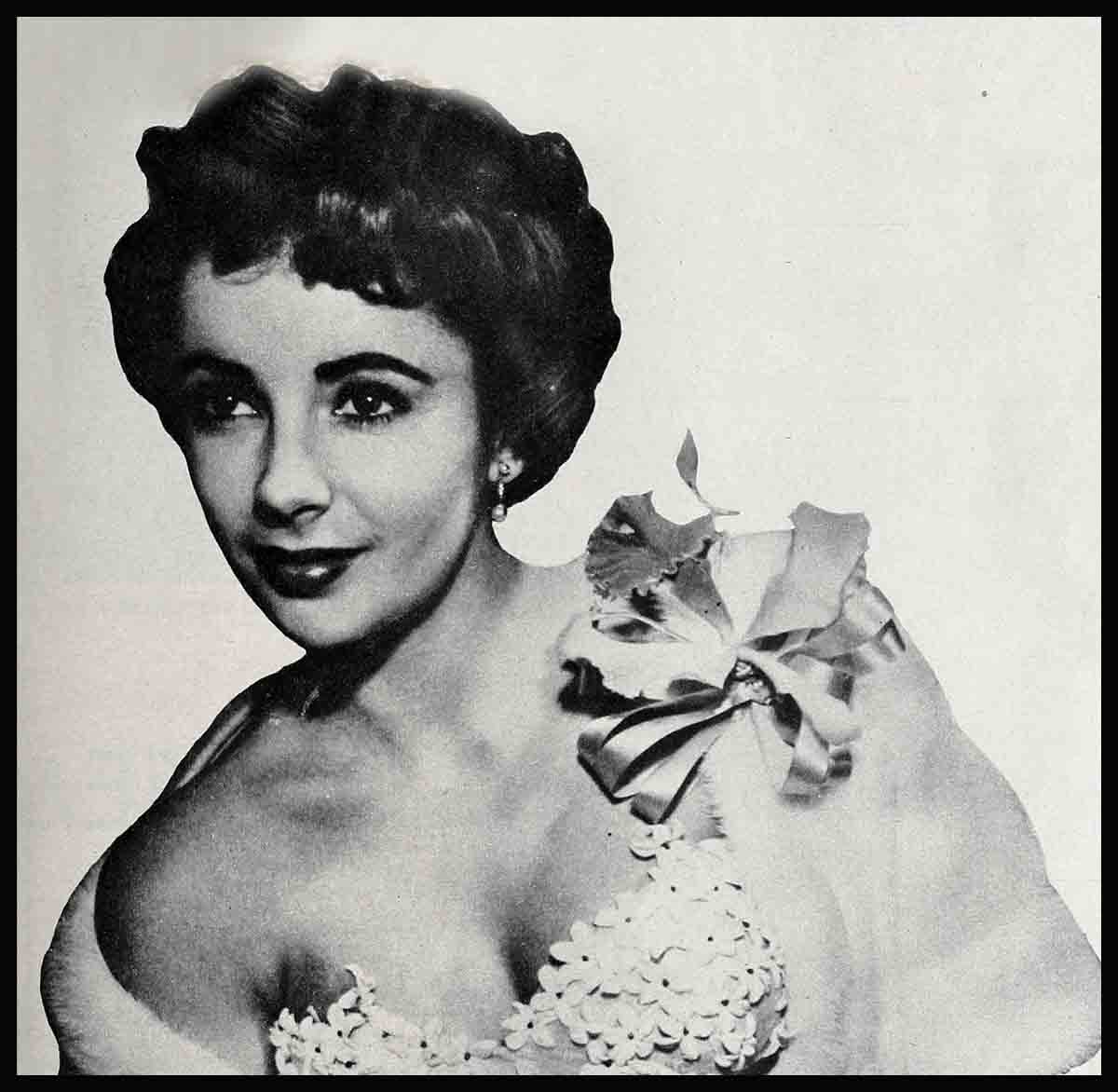
Sub-Deb Or Siren?—Elizabeth Taylor
What is this beautiful, seventeen-year-old Taylor child? A siren, whose greatest happiness is having young men fall hopelessly in love with her? Or is she just a young girl with great beauty who happens to have an unusual fascination for the admiring male sex?
A few years ago, Elizabeth’s greatest happiness was to tame a wild chipmunk or to ride the thoroughbred horse that was given her after she made her first important picture, “National Velvet.” Today, it’s different. One columnist recently prophesied Liz would one day make more sensational headlines than either Lana Turner or Rita Hayworth.
First and foremost, let me make it very clear that Elizabeth is neither woman of the world nor a heartless siren. She is, instead, a slightly bewildered girl who cannot so much as dance twice with the same boy without creating romantic rumors. She cannot do any of the normal, natural things a young girl enjoys, such as going to a dance or to a dinner party with a boy her own age, without having a writer of motion picture happenings say, “Elizabeth Taylor’s latest heartbeat is Jim Doakes,” or, “Jim Smith.”
This, of course, has come about because she had no more than made the headlines as All-American football hero Glenn Davis’s best girl, than she became, in rapid succession, engaged to and then disengaged from William Pawley Jr.
It was unfortunate that this was given so much publicity. The average seventeen-year-old girl is in and: out of love a dozen times before she marries. Usually, it’s laughed off as youth. In Elizabeth’s case, it was insisted she was a heartless girl who badly needed parental discipline.
Elizabeth, her mother, and her studio all were disturbed by the many unfavorable comments her alleged romances evoked. After one broadcaster very cruelly tore her to bits, and her mother telephoned with obvious distress, I decided to talk to this young lady, who, at the age of seventeen, was getting a dangerous reputation.
So, one afternoon, Elizabeth and I sat down before my fire and had a long talk.
“Miss Parsons,” she said, as she made herself comfortable, “I am not a jilt.”
Jilt? That was new phraseology.
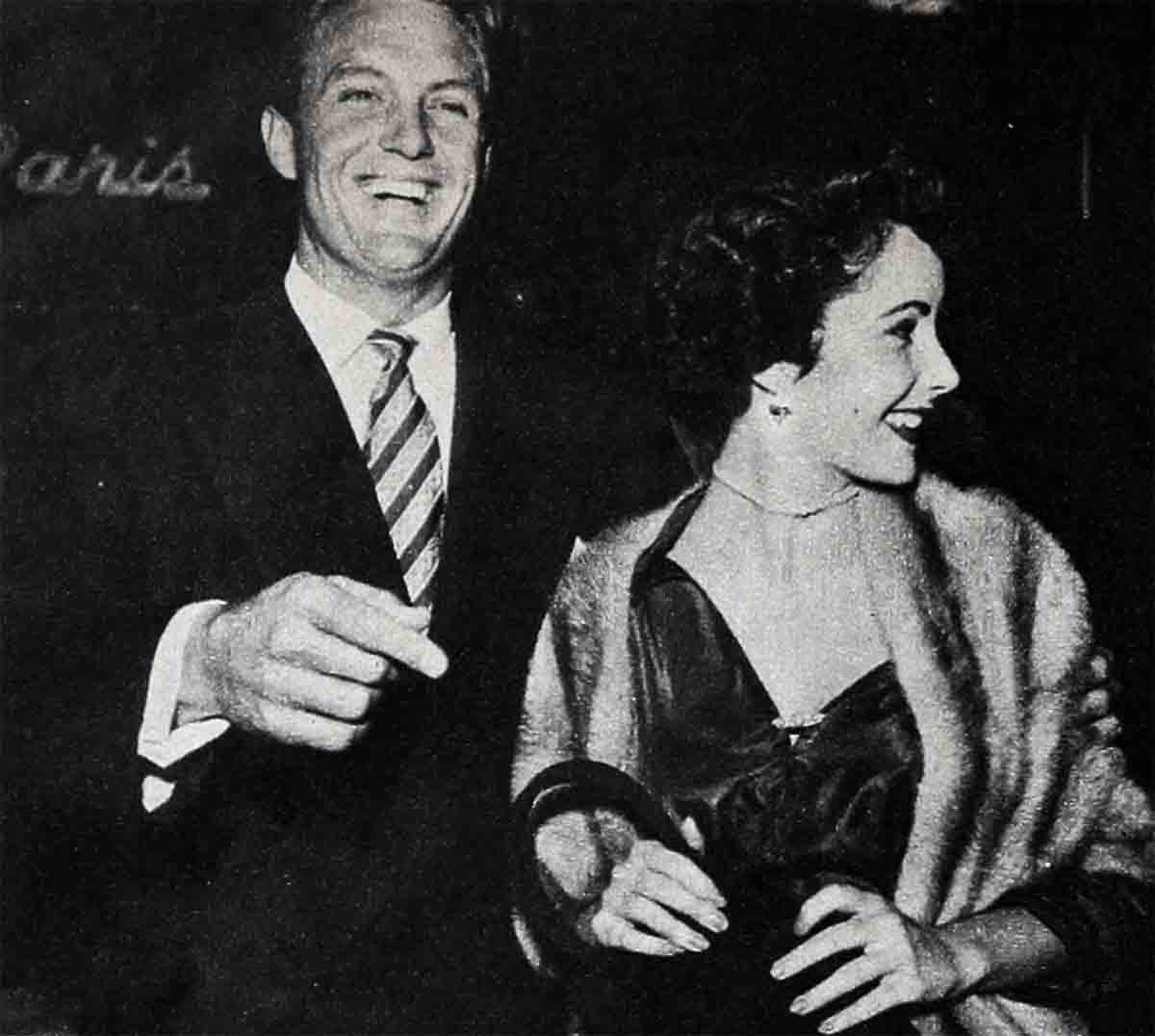
“Aren’t you, Elizabeth?” I replied, looking at her and thinking how much she looked like the lovely dolls that are in the shops. Her eyes are almost black, with lashes that curl up so attractively that she might well be the heroine described in earlier novels by sentimental authors.
“No, I’m not,” she said. “I was only engaged once in my life, and that was to William Pawley. I was in love with him, and he was in love with me. When we found out that we couldn’t possibly work out our marriage, we mutually agreed to end our engagement. Isn’t that better than getting married and a few years later getting a divorce? Believe me, Miss Parsons, when I marry it will be for keeps.”
“What about Glenn Davis?” I gently reminded her.
“I just had a schoolgirl crush on Glenn. What girl wouldn’t be thrilled to be noticed by a handsome football hero. I was only sixteen, and I wore a gold football around my neck, proudly, to let the world know I knew him and that he and I were friends.
“Those stories,” she went on, “that I planned to marry Glenn were the figment of some writer’s imagination. I still like Glenn, and we are very good friends.”
“If neither Glenn nor Bill were right for you, Elizabeth, how old do you think a girl should be when she does get married?” I asked her.
“I don’t believe age enters into it, Miss Parsons,” she answered. “Any woman, whether seventeen or twice that age, knows when she meets the one man she cannot live without, and with whom she wants to spend the rest of her days. As for me, I shall never be engaged again.”
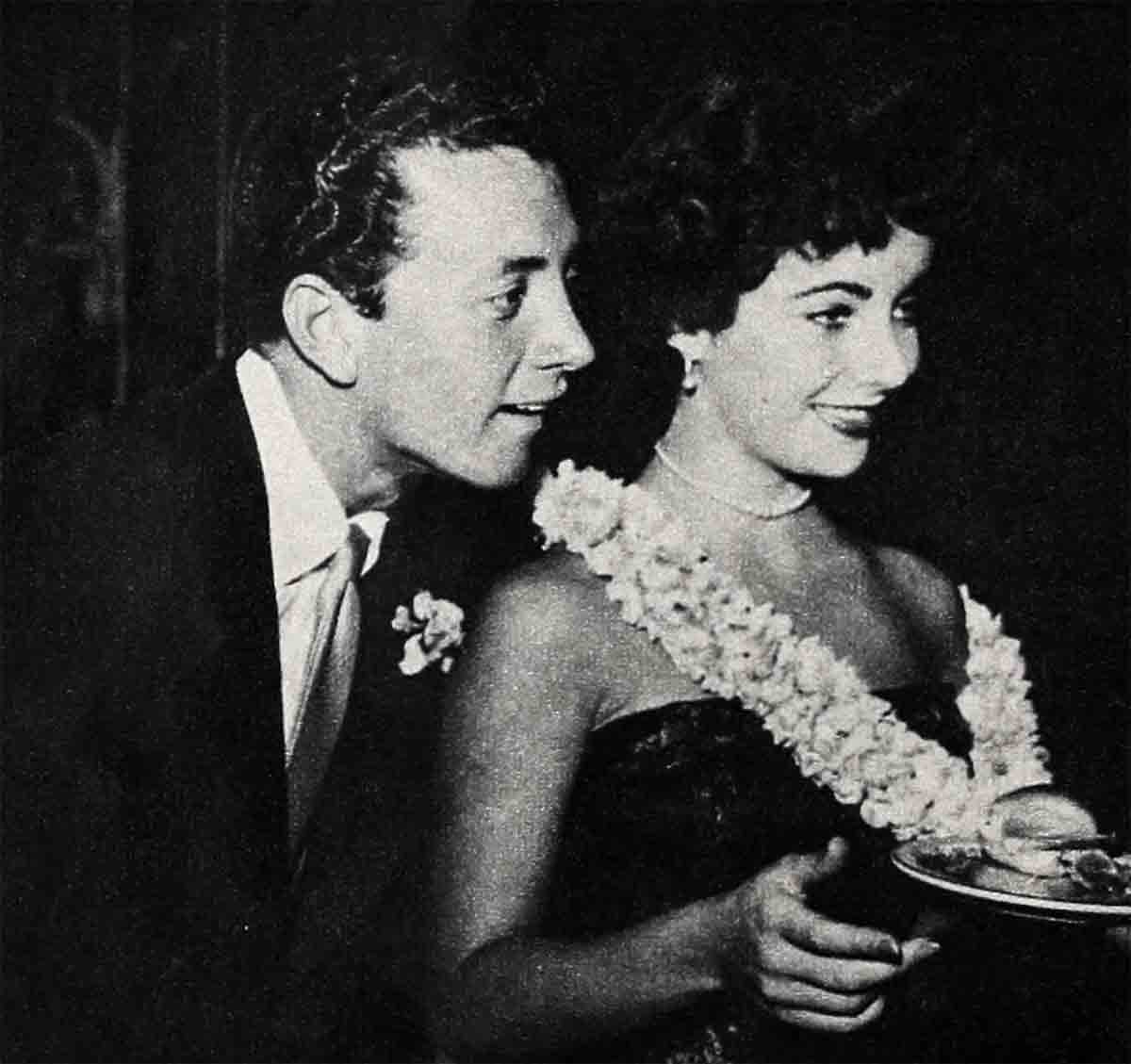
“What!” I almost shrieked. old maid? That never will be.”
“No, I won’t be an old maid, but when I decide I want to get married, I will just go and do it, and not have my engagement announced.”
“Oh, you couldn’t elope! You couldn’t do that to your mother,” I said.
“You misunderstand me,” she said. “I wouldn’t be engaged. I’ll marry with a church wedding, a bridal dress, orange blossoms, and all the trimmings. And I’ll certainly tell my mother, first of all. I love my mother. We are very close. Her unhappiness over that nasty broadcast, and over cruel things printed, upsets me more than even my own feelings.
“Why, that broadcast said I planned to leave my family when I am eighteen and live by myself. That’s a stupid, wicked untruth. I am a good girl. That’s why I hate to be called ‘that terrible Taylor girl.’ I intend to remain a good girl. I have very definite ideas on that subject. I don’t believe any girl should give herself to a man until she is married.”
“Good for you, Elizabeth,” I said. But I smiled to myself. The very thought of this lovely young thing being anything but good was so ridiculous that I had difficulty not laughing out loud.
But all this talk has hurt her so that she has become very. sensitive, as any high-principled young person might.
What is it about this child that is making her as discussed as though she was a siren of the world with a long list of smitten wolves on her trail? Is it her great beauty? Her poise? Or a combination of both? Young as she is, she has genuine glamour. It’s not concocted of any superficial things like sophisticated clothes or a desire to be a charmer. It’s an inner sparkle and excitement that is something with which Elizabeth was born.
For instance, I saw her come into a room at a party at Cobina Wright’s one night, during the time she was supposed to be engaged to Bill Pawley. She came alone because she was not going out with anyone else.
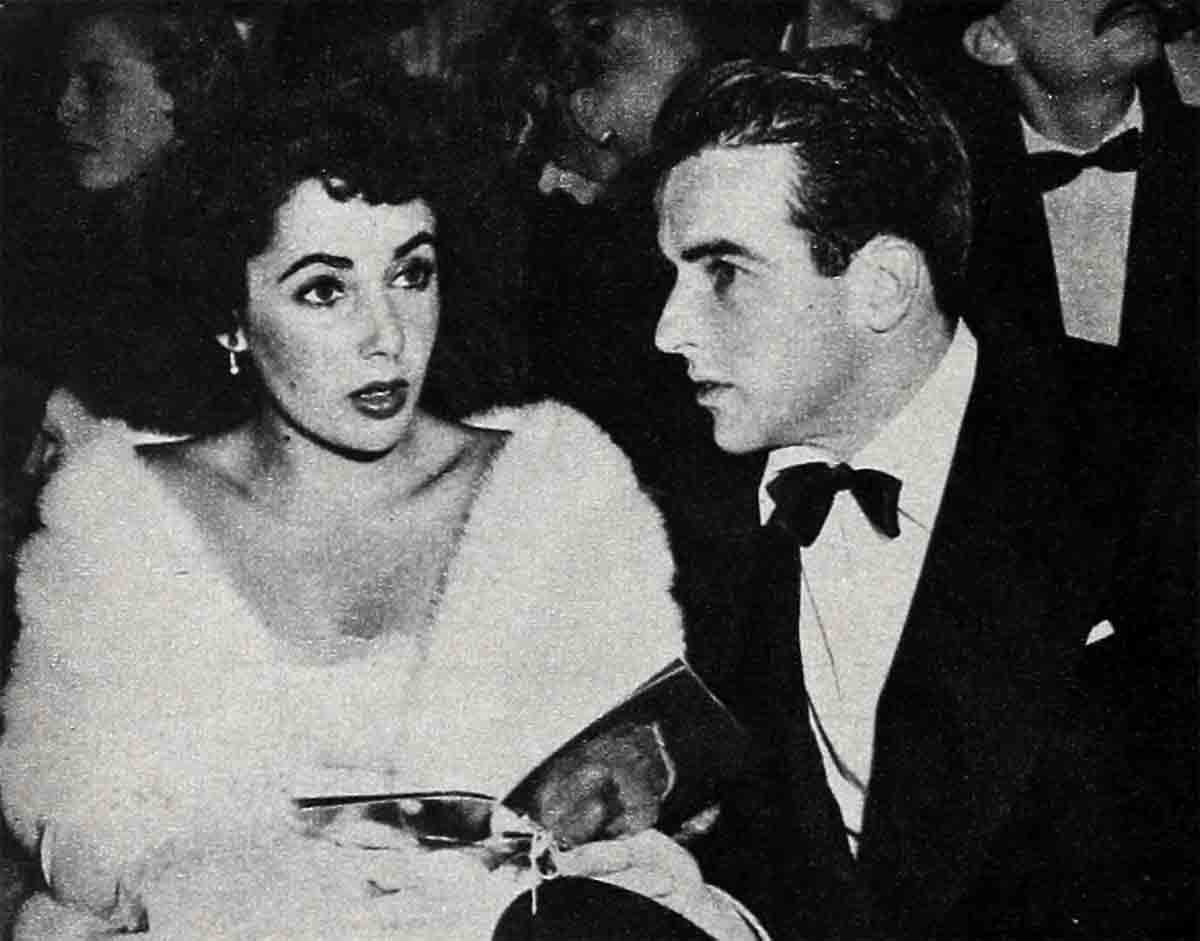
Her poise, for a young girl, entering a room filled with such sophisticates as Otto Preminger, Joan Crawford, the Reggie Gardiners, Joan Fontaine, Anne Baxter and others, was amazing.
Where most young girls would have been distressingly ill at ease, Liz, wearing a very low-cut formal gown, was the epitome of poise. She graciously acknowledged introductions and instead of seeking out a quiet corner and hiding there, she batted current topics of conversation around with the best of them. Such bearing in a seventeen-year-old is almost unnatural and one of the things, undoubtedly, that causes people to believe her a femme fatale.
Also, Elizabeth wears much deeper decolletage than the average girl. Her photograph in a photographer’s window on the Sunset Strip has the wolves whistling out loud, it is quite as low and daring as anything Lana Turner ever wore.
The truth of that is, Elizabeth loves the trappings of glamour, beautiful clothes, suitable jewelry and furs just as every other girl does, only, in her case, she can afford all the finery. Even though she is far too young to make any of the ‘best-dressed’ lists, she is dressed exclusively by Ceil Chapman, one of New York’s most sophisticated couturiers.
Chapman believes that Elizabeth will definitely be among the “Best-dressed” women when she becomes more maturely clothes conscious and can dress in an older and more subtle manner.
Elizabeth, I think, confuses all of us because she is, currently, a strange blend of girl and woman.
She has an “oomph” picture in the photographers window. But she still kneels at night and says the old-fashioned prayer, “Now I Lay Me Down to Sleep.” She still makes fudge in the kitchen on rainy days. And no other gift ever has meant as much to her as “King Charles,” the horse given to her after she completed “National Velvet.”
She is still sentimental enough to save things like party dance programs and to press corsages sent by beaus she particularly likes. Her favorite novels have the highly romantic boy-meets-girl theme. And her studies right now interest her especially because they are of the Victorian era. The Thackeray books delight her. She loves “Vanity Fair.”
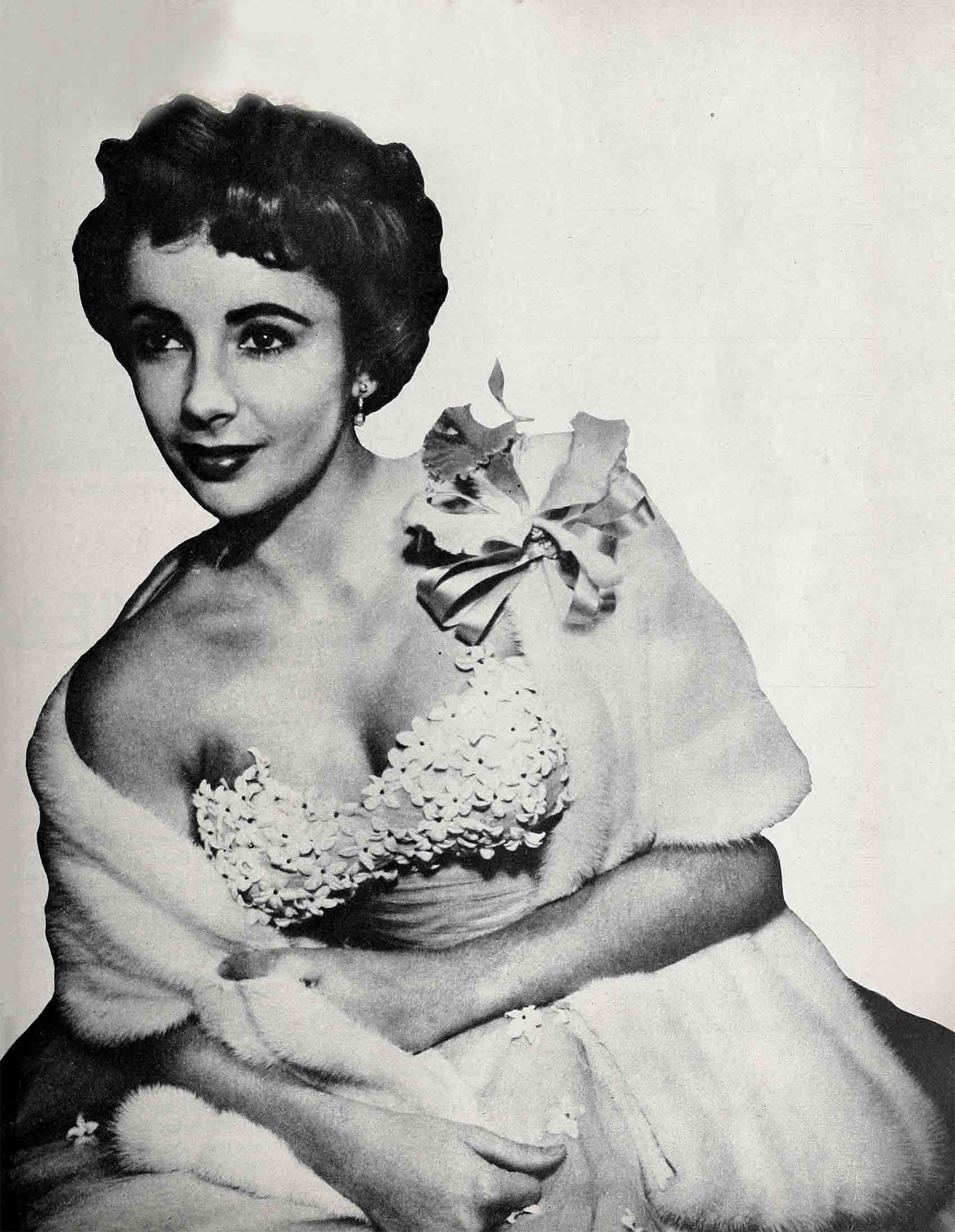
I think one of her chief worries is that all the talk makes her somehow different from girl friends her own age.
But, as I explained to her, that is the price of fame. “Elizabeth, if you had been Dottie Doaks in Paducah, you could have done many things that Elizabeth Taylor of Hollywood cannot do without criticism,” I explained to her.
“Sometimes, I wonder if it’s worth it,” she sighed.
“Oh, come now,” I said, suspicious for a moment that she was pulling my leg, going demure. “You know you don’t mean that.”
“No, I honestly don’t,” she admitted. “But you don’t know how hard it is to go into a heavy emotional scene on the set when your heart is breaking over cruel things said about you.”
“Honey, there isn’t a girl who wouldn’t love to change places with you, so try to bear up under what they say. Take me. I’ve been panned by experts, and I’ve managed to survive. It is not pleasant, and it hurts, but try not to be too sensitive, about it,” I told her.
“Perhaps I am too sensitive, but I honestly think I could take it,” she answered, “if it weren’t so hard on my mother. She’s so hurt at all the cruel, unkind things said about me.
Listen to this, please, and believe it. I have been out night-clubbing just three times in my life without my parents. Just three times! Once, while Bill and I were engaged, I went to Mocambo with him. Another time, I was at the same place in Jane Powell’s wedding party. The only other time, I was with Mr. and Mrs. Marshall Thompson and her brother.
“All the other times, my parents have been along, and usually, my brother and his girl. But is this ever mentioned in the gossip columns? No! They ‘block out’ my family and just mention me and the boy friend who has come along as a dancing partner.
“The result is, I’m being painted as a good-time-girl who stays out all hours of the night. That’s hard to take. If you could see how my mother cries, you’d know what I mean.”
I do know how her mother feels. I’ve talked over the telephone to Mrs. Taylor when she’s been upset over some broadcast, or, at what she has considered a disgraceful attack on her lovely child.
The last time we talked, Mrs. Taylor told me, “Elizabeth is discussed as though she were a woman of the world and knew all the answers. The other night she told me, ‘If I knew all the answers ahead of time and had the wisdom of experience, I would be an adult while I am little more than a child!’ ”
She is so right!
When it was time for Elizabeth to go, she did something very sweet. “May I come and see you often?” she asked. “We live so close and it makes me feel better to talk to you.”
I meant every word of it when I told her, “Any day of the week, and I’ll always love to see you.”
All in all, Elizabeth Taylor is a puzzling combination of girl and woman. Her personality has not yet jelled. Only time will tell what she eventually will be, a settled miss, scared to make a natural move because of what may be said about her, or one of the really great glamour girls. I can see the child’s problem. It’s tough. But not as tough as she thinks it is now.
THE END
—BY SOUELLA O. PARSONS
It is a quote. PHOTOPLAY MAGAZINE MARCH 1950




